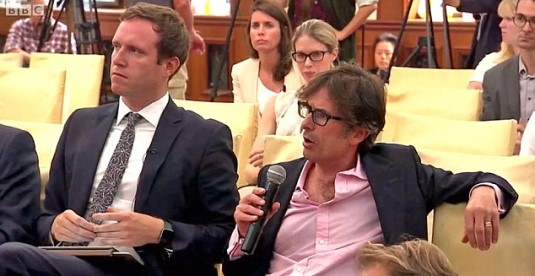
Neither you nor I are naifs when it comes to media bias. It's ABC not just for leftist politics, but for the wider populace too. Especially newspapers. But broadcast media is held to a different standard than the overt propaganda pumped out by The Sun to its ever decreasing readership. The BBC is supposed to epitomise the best standards when it comes to journalism. It is expected to be balanced and analytical, evidence-based and well-researched, and trades off this reputation. If the BBC cover it, it has to be true. And so hack questions like "do you want to nationalise sausages?", the touting of rumour and gossip as fact, passing off shoddy work as proper journalism, and "balancing" a news story to the point of misleading, it all matters. It drags the BBC's reputation through the mud and feeds the naive cynicism out there, the same cynicism benefiting the Tories.
So what? The BBC have always slanted their journalism. So has ITN and Sky, as well as all the bourgeois press. There really is nothing new under the sun. Establishment journalism in defending the establishment against plebeian insurgency shocker. The BBC and other media operations have acted this way before, but why the sense that, this time, it's more blatant than previously?
There is obvious concern with what a Corbyn-led government means for them. I mean, seriously, democracy at the BBC? Outrageous. The breaking up of press monopolies and their fundamental reorientation around community reporting and public interest journalism? Unconscionable. A curbing of the humongous salaries commanded by celebrity hacks, as well as managers and bureaucrats at the top of the media tree? Unutterable. Add to this how the bulk of Westminster lobby regard Corbynism as fundamentally illegitimate, and you can't avoid the conclusion that how the likes of Kuenssberg, Peston and the rest frame stories and choose their talking points is less a matter of honest slips and more one rooted in visceral disdain and outright opposition to what the left are trying to achieve. How else to explain their pathetic cretinism, even when the Tories are threatening the licence fee?
Yet in situations of polarised politics people are hyper aware of the nuances and slants within the discourse bearing down on them, which now thanks to social media is more visible than ever before. With the elevation of celebrity to the level of aristocracy and the playing out of their relationships across choice platforms, how sections of the ruling class reproduce themselves is visiblised. The friendships, the mutually beneficial back-scratching, commercial ties, the passporting names and connections confer, rivalries and animosities, the strategies pursued to maintain privilege and position, it's all out in the open. The same is true of our politics journalists. We can see who links to who, who amplifies whose stories, who are cast to the outer darkness of their world and who remains very much part of it. And by the patterns of similar messaging, it requires less a conspiratorial mindset and more a sociological imagination to understand how shared working conditions, patterns of access to leading politicians, common assumptions, and shared views about what is and isn't reasonable politics gives rise to systemic bias, professional solidarity, and groupthink. And this is all taking place in full view of their huge social media following.
We see it, but they carry on as if we can't. The bias we see on our screens is rendered all the more obvious and visible by their social media game. And so what we have is awful reporting carried by the prestigious name of the outlets they work for, rendered all the more problematic by the arrogance of their conduct away from the TV screens. Therefore it's not that broadcast journalism is qualitatively worse or more corrupt than what has gone before, but it has become increasingly obvious. And it's not about to get better, unless Boris Johnson is booted out of Number 10 on Thursday.
2 comments:
The media also hardly trumpeted the latest economic figures showing growth had flat-lined over the last 3 months.
If this had been Corbyn the media would have splashed it all over there coverage with links to turning us into Venezuela etc.
Luckily the brilliant RT was on hand to provide us with this information, thank god for them!
I was watching the BBC feedback show and the answer from the mouthpiece was that yes there headlines had distorted the truth but the detailed information was available online for anyone to see, how disingenuous is that! These stenographers of the ruling class know only too well that headlines are more important than the details, that is what are are for after all!
In fact the BBC reminded me of the vogon captain from Hitchhikers Guide, telling humans that the plans to destroy the Earth had been available in the planning department archives on the planet Alpha Centuri!
One thi.g thst struck me was the visual image management, almost following a formula whenever a consevative actor was speaking the imsge stayed focused om them, when it was a labour person the camers woud intermittently flick to their opponent who was usually shaking their head.
Post a Comment